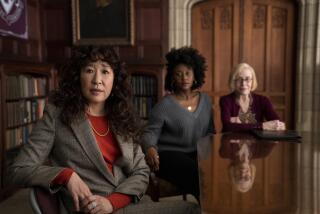Rise of the geeky girls
- Share via
Sasha Alexander had suspicions about her character from the start. But it wasn’t until Maura Isles obsessed over a date’s skin condition that Alexander got it: She was playing a geek.
“She held his hand and said, ‘You have very dry hands.’ And she couldn’t get it out of her head,” recalls Alexander, whose Isles character is a medical examiner on TNT’s “Rizzoli & Isles.” “He was so weirded out, he left dinner. That moment solidified it for me. That’s when I realized she was a geek — she can’t control herself around the things she knows so much about.”
Geeks: Computer-obsessed guys who quote “Star Wars” and play World of Warcraft and never leave their basement. But what if the gender is flipped? Today, some of TV’s most interesting females are closeted — and not-so-closeted — geek girls. They’re twitchy, socially awkward, hyper-passionate and focused on their careers — and beloved by audiences. Glasses are optional.
“We’re seeing an evolution of women changing in television, and I think that’s because women are changing in the real world,” says Julie Benz, whose character Stephanie Powell is “definitely a science and lab and tech geek” on the just canceled “No Ordinary Family.”
“Women like Stephanie are being the breadwinner, having the career, taking on that masculine role. We’re seeing that reflected in television,” she says.
Anna Torv doesn’t quite embrace the geek description but admits her Olivia Dunham on the sci-fi series “Fringe” is not your normal female investigator. “Olivia is the one who’s focused on her job and not good with talking about emotions,” she says. “Those characters have in the past often been played by men. Our writers make no excuses for her being that way.”
Writers do seem to enjoy exploring the possibilities of a female character that doesn’t fit the expected love interest/mom role in both dramas and comedies. Executive producer Robert Carlock likes to call Tina Fey’s Liz Lemon “a late bloomer” on “30 Rock,” but the truth is she got out of jury duty by dressing up as Princess Leia and used a Super Mario Bros. voice as her answering machine message. Geeky enough for you?
“It is more fun to write a character who embraces those aspects of herself,” Carlock says. “We all have things we’re embarrassed about from our youth, and the cool girl won’t acknowledge them. That’s less fun. And geeky girls look good in glasses.”
They can also be inspirational role models.
“When I was younger and watching TV, I was this gawky, outgoing, spastic child, and I had a hard time finding characters on television that reminded me of myself,” says “Glee’s” Lea Michele. With her Rachel Berry character, she says, “I’m proud to show girls out there that it’s OK if you don’t look or act like everyone else — your uniqueness is what makes you truly special.”
“We’re all trying to be cool and hoping people think we’re cool, but everyone has that awkward, dorky, nerdy side to them,” says Emily Deschanel, whose titular “Bones” character may in fact be the Ur-nerd for this generation (her best friend in high school was the janitor, who would find her dead animals to dissect).
“It’s understandable to assume that audiences want to see cool people — but Hollywood may have been blinded by its own assumptions,” she continues. “People were ashamed to be a nerd before … but you have the Internet now, and you can connect with something you’re nerdy about and gain confidence in numbers.”
Confidence in numbers (and the Internet to share opinions) may even play a role in creating today’s beloved geek girls. Kaley Cuoco’s Penny character started out as the girl next door to the geeks on “Big Bang Theory,” but four seasons later, both actress and character are changing. “I now know more about the sci-fi world than ever,” Cuoco says. “And the audience loves it when Penny says something nerdy, when she starts speaking their language. We learned how devoted the fans are very quickly at Comic-Con,” she says of the annual convention, where Hollywood goes to show off its fanboy projects.
It’s that nerd inside everyone that writers today are tapping not just to create unusual female characters but also to explore the traits audiences can embrace, possibly redefining what being human means on television. And for the actresses involved, the more the merrier. Notes Alexander, “In the 20th century, blonds had more fun. In the 21st century, geeks are the life of the party.”
More to Read
The biggest entertainment stories
Get our big stories about Hollywood, film, television, music, arts, culture and more right in your inbox as soon as they publish.
You may occasionally receive promotional content from the Los Angeles Times.










